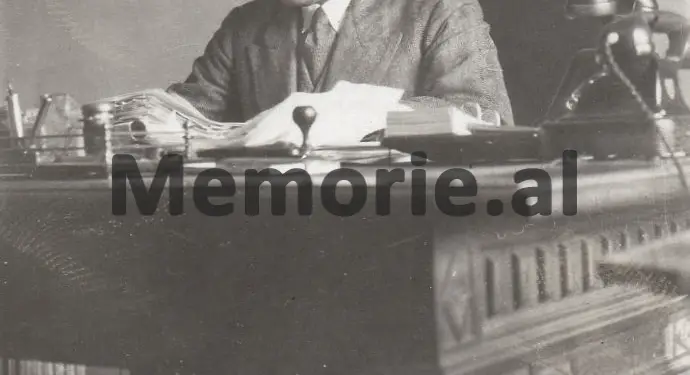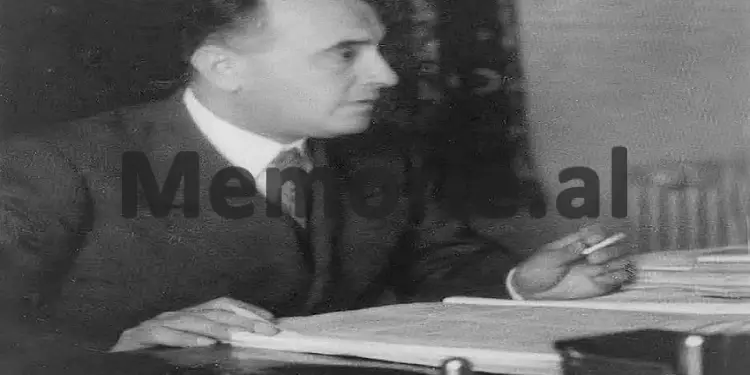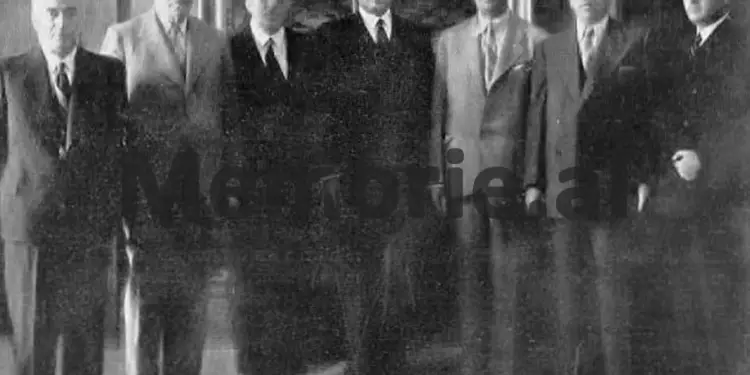By Arben Pustina
The ninth part
-Rrok Gera, a proper statesman –
FORWARD
Memorie.al / This book aims to convey to the public the image of a perfect man, who lived in other times, but who was the best example, not only of what an ordinary man can represent, but, next first, as an example of a noble, distinguished, omniscient and, above all, honest statesman. Having in his genes the noble virtues of his origin, being formed as a personality in a wonderful environment, such as Shkodra at the beginning of the 20th century, and graduating from one of the most prestigious universities in Europe, such as that of In Vienna, Rrok Gera had all the potential to be one of the important figures who gave rise to a rapid development through comprehensive reforms in Albania in the 30s of the last century.
This development reached its peak with the government of Mehdi Frashër, considered perhaps the best Albanian government of all time, formed for the most part by non-political persons, among who was Rrok Gera. For 10 years, or more, as a minister or in other high state functions, he worked with conviction that he was walking on the right path for the consolidation of the Albanian state, a process for which he said he had no time to lose. Economist, financier, diplomat, lawyer, Gera was a specialist who advanced towards the top with his professionalism in an environment where the old factions, which were almost dominant in politics and governance, lost ground in front of young and educated people good.
RETURN TO ALBANIA AND ACTIVATION IN THE STATE ADMINISTRATION
In October 1935, he was given the portfolio of Minister of Finance in Mehdi Frashër’s cabinet. He came to his workplace full of enthusiasm in addition to technical knowledge and work experience in this department. But he had limited freedom for his initiatives to make radical changes in the financial administration, during the short stay of the Frashëri Government. He was appointed Chairman of the Audit Council in April 1937 and Minister of National Economy, when the last Government was partially reconstituted, at the end of May 1938″.
On 09.11.1936, on the occasion of his resignation from the position of Minister of Finance, Rrok Gera addressed through a circular to all the employees of the finance and customs structures in the country: “…On the occasion that I am leaving the Department of Finance, I see it as my duty to thank you for the correct cooperation and kindness you have shown me as a colleague and minister during my time in the Ministry of Finance. Apologize for any harsh behavior we may have in the performance of duty, but never personally. Former Minister of Finance: RROK GERA d.v.”.
It has already been appreciated by many that during the Frashëri cabinet period, Albania experienced a certain liberal democracy, where there were frequent parliamentary interpellations, long debates with ministers (in Parliament), criticism of the government, denunciations of ministers as individuals and a vote of confidence. for the government, these are new things for that time. The Frashëri government is probably the only one that was overthrown by the Parliament, as far as the period between the two world wars is concerned. However, this cabinet remains a unique experience in the country’s history, as it managed to unfold several elements that make it clearly distinguishable from other cabinets of this period. The most special thing is that this cabinet consisted almost only of non-parliamentarians and most of the ministers did not have a high social status and did not come from the rich or influential layers of the Albanian society. Therefore, it is not surprising that the parliament, quite different from what it had done with the previous cabinets, strongly opposed Mehdi Frashëri’s government.
While in terms of foreign policy (connecting it with finance and economy, where Rrok Gera was the protagonist) we can approve that, all that we have said so far, as well as what will be seen in the following, clearly shows that the Italian policy for an economic and financial devouring of Albania, did not reach its goal and this is affirmed by many famous Italian authors, among whom are protagonists of Italian efforts to absorb the Albanian economy, such as Amedeo Gambino.
According to Alessandro Roselli, during the 1930s, there were feelings of dissatisfaction in Italian economic-political circles regarding financial relations with Albania, and this dissatisfaction deepened especially in 1936, when the bilateral trade balance improved in Albania’s favor. The table below gives data on the volume of trade between Albania and Italy in the years 1930-1938, in millions of Albanian francs, and from the figures, it is clear the tendency of the significant decline of Italian exports to Albania during 1934, 1935 and 1936, while Albanian exports increased.
While the following table gives the data on Albania’s foreign trade with Italy and other countries (in percentage): Even here, almost the same fact stands out (which undoubtedly angered the Italian political and economic circles immensely), that especially in the years 1935, 1936 and 1937, Albania significantly increased its imports from other countries and greatly reduced its imports from Italy, while increasing its exports to Italy, especially for the years 1936 and 1937.
Amedeo Gambino, for many years the Delegate Advisor of the National Bank of Albania, in his article in 1940 bluntly expressed the disappointment of Rome, because the model of Italian capital investments in Albania did not match the model of trade between Italy of Albania: “…Albania’s trade deficit with Italy, which initially increased with the expansion of Italian investments in Albania, shrank in the following years, until it was replaced in 1936 and 1937 with a surplus.
Thus, the contributions of Italian capital, instead of increasing the volume of Italian products to Albania, ended up in a foreign currency, available to Albania for the import of products from third countries, which, moreover, did not allow any export from Albania. According to Roselli, from a political point of view, these words of Gambino show that King Zog did not at all see his country as so connected to Italy as to allow the latter to dictate economic policies to him as well as ask for a preferential trade relations to include the absorption of Italian products.
CHAIRMAN OF THE CONTROLLING COUNCIL
After the resignation of the Frashëri cabinet, on March 20, 1937, Rrok Gera was appointed head of the Control Council (today the State Supreme Control). By coincidence, his brother, Lac Gera, had also been a member of this institution for several years, as well as the chairman in 1926. In the book “Albania in 1937”, it is shown that at that time, the Control Council consisted of a chairman (Rrok Gera), two members (Llambi Aleksi and Asim Jakova) and a prosecutor (Ilia Kotia).
Also, an integral part of the Council was the control bodies: the five referenda and the nine controllers as well as the secretarial bodies: a secretary, an archivist and a copyist. Rrok Gera was the only one of the leaders of the Control Council for the pre-liberation period who had the degree of “Doctor of Science” and probably the only one who had the relevant full education. (This was also affirmed in the speech of the former head of KLSh, Bujar Leskaj, held on the occasion of the 90th anniversary of the establishment of the institution headed by him).
In an interview given to “Tirana Observer” (July 2007), the former head of the Supreme State Audit, Mustafa Kirçuku, appreciated the professionalism of those who worked in the Audit Council during the Monarchy years: “They were genuine specialists. . Even the reports that I have observed were very well written, accurately, well formulated and dealt with the problems as they should, bringing out in the reports the good sides and the bad sides found during the controls…”.
Of course, Mr. Kirçuku’s evaluations also go to Rrok Gera, who remained at the head of this Council until the end of May 1938. In the letter dated January 9, 1938, with protocol number 331, Gera, in the capacity of Chairman of the Control Council, wrote to all his subordinates regarding a change in the regulation of the General Accounting of the State, based on which, the Controlling Council was charged with the special supervision of the granted advances.
The document in question gives us an idea of how the Control Council worked at that time: “…Mr.Z. The members are requested to arrange in agreement with the authorities in question (Referendars and Comptrollers. – St. Im., A.P.), the most suitable way for later in the evidence mainly: a) authorizations of advances, b) their payment by Finances (announcement within the legal deadline by the Financial Offices on the amounts of payments) c) submission of accounts within the legal deadline by the respective Administrations and ç) detection of defects ascertained during the ongoing inspection.
Mr. Z. Referendars and Mr. The controllers have notified Mr. To the Members, or to this Presidency, not only the non-implementation by the Administrations of the orders of the Regulation in force, but also any other issue that should be brought to their attention, such as the accumulation of many advances in one hand, the payment of relatively high amounts of quintances with stamps, or with the fingers of illiterate people, etc.”. At the end, the letter closed with the words: “… This Presidency has asked me from time to time for explanations on issues, therefore it is requested that this act be implemented as scrupulously as possible”.
At the time he was in charge of the Supervisory Council, Rrok Gera had other duties. From a document of the Albanian Parliament of 1938, we learn that he was in charge of the Pensions Commission, in which there were also representatives from the State Council, the Ministry of Finance, the Directorate of Pensions and the National Defense Command.
From the document we learn that the Council of Ministers had addressed to the Pension Commission letter no. 71/II, dated 5. III. 1938, accompanied by letter no. 48/III, dated 8. III. 1938, of the Ministry of Finance, which requested that this Commission draw up a new draft regulation on the pensions of municipal employees, compatible with the provisions of the law on civil and military pensions in force and with the provisions of the law on municipalities . The commission, headed by Gera, after examining the relative file and studying the matter in detail, concluded that the system created by Art. 65 of the law of municipalities, dated 30.04.1934, presented many difficulties for a good operation.
This is because the creation of an autonomous treasury contained in itself the impossibility of proper control over the movement of money, and this treasury after a while was not going to be able to make its payments properly, or even at all, because that her income was quite small and insufficient compared to the great seniority that the employees had at that time, for the benefit of pension rights.
Also, the Pensions Commission considered that collecting the percentages of co-payers from the municipalities, sending this money to the center near the capital’s municipality, then paying all pensioners wherever they were, etc., was not at all simple. Based on this situation, the Commission issued its decision no. 73, dated 8.04.1938, where it was stated that: it would be reasonable, that instead of a regulation for the proper implementation of Art. 65 of the law of municipalities, dated 30.04.1934, there was a need to draft a law, which, by abrogating the system created by this article, would set new and safer bases on the way of regulating the pension rights of municipal employees.
For this purpose, the Commission, after the study carried out by it, compiled a draft law with the aim of regulating in a simple and secure way the rights and duties of municipal employees and the methods of payment of pensions and bonuses that would be liquidated themselves, or their families. According to the Commission, with the implementation of this law, there would be no need for any other regulations, as the law was complete. The Pensions Commission, headed by Rrok Gerën, gave a lecture to the Council of Ministers, offering a complete law, which defined all the mechanisms for the retirement process of municipal employees, in compliance with the provisions of the law on civil pensions and military in force and with the provisions of the municipal law.
MINISTER OF NATIONAL ECONOMY IN THE GOVERNMENT OF KOÇO KOTA
In the spring of 1938, Italy sought to further increase its influence on the Albanian economy. At that time, the Italian circles were interested in obtaining permission for new concessions from the Albanian side, but it was said under their breath that the King was not very satisfied with the developments in the Ministry of National Economy, as he thought that more zeal was being shown there than what was needed, regarding the possibility and manner of granting these concessions. In this situation, on May 31, 1938, Rrok Gera was appointed at the head of the Department of Economy, replacing Terenc Toçin, who resigned. The changes in the Albanian government cabinet (besides Rrok Gera, we also have Abdurrahman Dibrë, appointed to the post of Minister of Education), are widely reflected in the reports of the US minister in Tirana, Grant.
In the telegram dated June 10, 1938, sent to Cordell Hull, secretary of state in Washington, the American ambassador wrote: “…It is generally believed in diplomatic circles that the change in the government cabinet, which resulted in the appointment of two new ministers and a deputy minister, may constitute an element of the political strategy directed against the Italians by King Zog…!
As for the new members of the Cabinet: Dibra, Gera and Toptani, a few days after their appointment, I met these gentlemen and they welcomed me very cordially. In particular, Gera has been very cordial with me and the Embassy…! Gera was Minister of Finance in Mehdi Frashër’s cabinet in 1935-1936, which, with the exception of the Prime Minister, was composed of young progressives. He is only 37 years old and received an excellent education in finance and economics at the University of Vienna. There is also a general opinion about Gera that he has no connection with Italy…”.
About this moment of change in the Kota cabinet, 150 Hugh G. Grant-Smith writes in his book “Entstehung und Ausbau der Koningsdiktatur in Albanian, 1912-1939”: “…In this small change it should be noted that former Minister of Finance in the Frashëri cabinet; Rrok Gera, returned to the government. His appointment was not to the taste of the Italians…! With this change, the discussion about a customs union (between Italy and Albania – my Saint, A.P.) came to an end.” In the same line, the Bank of England expressed itself, which in one of its articles described the appointment of Rrok Gera as the head of the Ministry of National Economy as “a significant political change”, which put at the head of the Albanian economy a representative of new school, with a different attitude towards the goals of Rome.
Even the country’s press was focused on the changes in the government. The newspaper “Drita”, in its issues dated June 3-4, 1938, conveyed to the readers the first moments of the beginning of the duties for the Minister of Education, Dibra, and the Minister of National Economy, Gera: “…New ministers: Mr. Minister of Education, Abdurrahman Dibra and Mr. Minister of National Economy, Mr. Rrok Gera, went this morning to Durrës, to take the proper oath before Lart Madhnia the King and as soon as they return from there, they will start their new task (June 3). …The new ministers started their duties after receiving many congratulations.” (June 4).
In its issue of June 6, 1938, the newspaper “Java” gave a short biography of the new ministers. In the comment section about Gera, the newspaper wrote very positively about him: “Mr. Rrok Gera is one of the young intellectuals who are valued in our country. A deep learner, with unlimited self-confidence. He has performed the high tasks that have been assigned to him until today with a full conscience and blindly served only the interests of the country”.
Upon his arrival at the head of the national economy department, Gera addressed all the structures subordinate to the Ministry, with the circular telegram dated 03.06.1938, with protocol number 2555, in which he wrote: “…His Majesty the King , deigned to charge us with the direction of the Department of National Economy. We expect you to continue with honor and conscience in your duty and contribute with your work and ability to complete what the King and the Fatherland expect from us together with you. We would be very sorry if, due to negligence, lack of skills or other reasons incompatible with the fundamental principles of the State, our cooperation suffered a shock. Minister: Rrok Gera”. Memorie.al


















